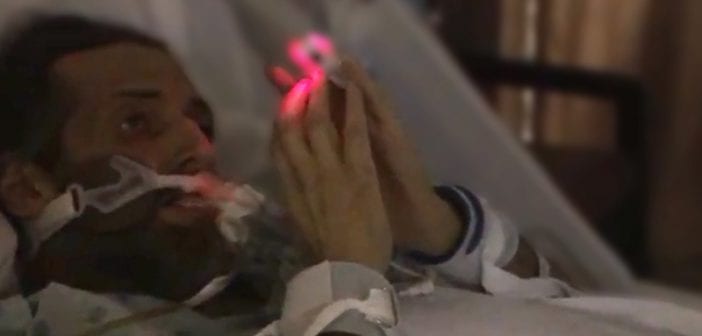Chris Dunn, a 46-year-old Texan, a son, a brother, and a friend, passed away on December 23, 2015. Chris’s mother, Evelyn, has bravely carried on Chris’s fight for all Texans by challenging in court the Texas Advance Directives Act to which Chris fell victim. During the court battle, Houston Methodist is trying to keep the judge from seeing this video that shows Chris praying for his life while at that hospital.
People across America were stunned to see Chris praying for his life after Houston Methodist Hospital decided that Chris’s Life was futile and that Chris would no longer receive care there. Distraught, Evelyn sought legal help to protect her son. Chris’s attorneys captured the video, proving that Chris understood what was happening to him and did not want his medical team to end his care—and his life.
Even though Methodist refused tests to confirm Chris’s diagnosis, both Chris and Evelyn recognized that Chris was severely ill and disabled, but critical illness or disability should not be the basis for removing care and hence speeding the death of a patient. Chris had been sick for a long time and avoided going to the hospital; even so, both he and Evelyn understood that Chris’s Life was fragile and perhaps his days numbered.
Evelyn often wondered: “If they [Houston Methodist] are so sure that Chris is that sick and dying, why do they have to speed that up? Why can’t they wait for him to die if they really think that he will die soon?” Because Texas law allows hospitals to make futile care judgments without limit!!! The injustice that threatened Chris’s Life in his final weeks is a real threat to any patient hospitalized in Texas.
The Texas Advance Directives Act, also known as the 10-Day-Law or the Futile Care Law, grants hospitals the authority to make life and death decisions for any vulnerable hospital patient, even if that decision contradicts the written or stated wishes of the patient or the patient’s legal decision-maker. Even though he was conscious and clearly expressed his desire to continue treatment, Chris’s civil liberties were denied under the statutory process.
The 10-Day-Law is a blemish on our record of protecting innocent human Life in Texas, whether the preborn, the elderly, or vulnerable hospital patients. The current Texas law authorizes a faceless hospital committee to make the decision to end care of a patient as long as the hospital provides the patient or family with just 10 days notice. There is no way to appeal the decision of the hospital death panel in court or even to appeal to a health care oversight agency.
Evelyn was horrified to learn of this law, which is why she sought legal help to protect Chris until he was transferred or died. The attorneys recorded their conversation with Chris as part as routine attorney-client proceedings. The outpouring of love, support, and prayers for Evelyn and Chris was overwhelming, and people across the US and Texas remain stunned that the rights of hospitalized patients in Texas are zilch.
The video was so heart-wrenching and compelling that now Houston Methodist is afraid that more hearts will swayed if the video is allowed in court—during the arguments about the very law that endangered Chris’s Life. Houston Methodist not only wants to hide behind the Futile Care Law, now they want to hide evidence that Chris was alive and conscious.

